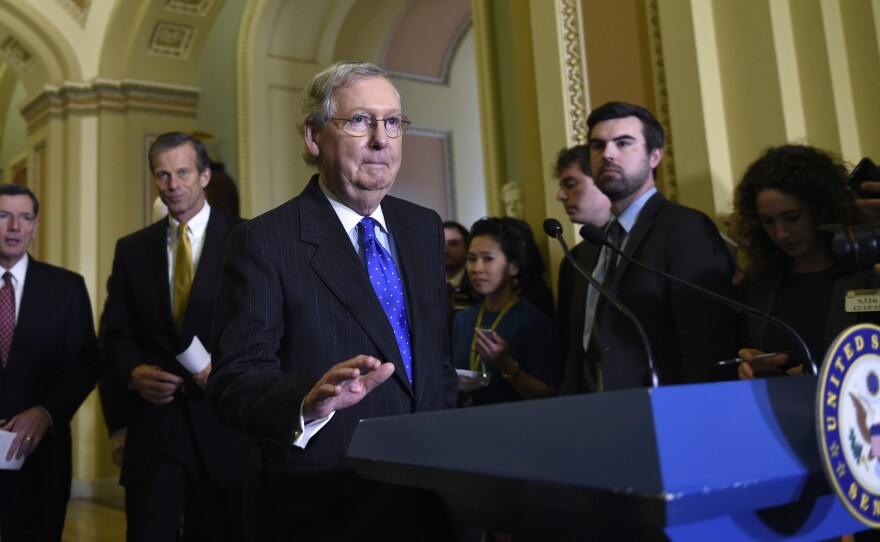Within hours of Justice Antonin Scalia's death, Senate Majority Leader Mitch McConnell aimed to squash any expectation that President Obama will get to name his successor.
"The American people should have a voice in the selection of their next Supreme Court justice," he said in a statement. "Therefore, this vacancy should not be filled until we have a new president."
McConnell wants to make sure the next president is a Republican. But even more than that, McConnell wants to make sure that Republicans retain control of the U.S. Senate.
Last month at the annual Republican retreat, McConnell made clear that it was his intention to steer the Senate this year to protect his incumbents. Until Scalia's death, that meant keeping to a modest legislative agenda, passing necessary spending bills and allowing senators plenty of time back home to campaign this year.
A potentially nasty Senate fight over replacing Scalia was not part of McConnell's 2016 road map.
Now, the open question is whether Republicans' refusal to consider a Supreme Court nominee will blow back on those same incumbents McConnell is trying to protect.
The 2016 presidential contest has sucked up the nation's political oxygen, but beneath that marquee race is a broader fight for control of the Senate, the outcome of which will be hugely consequential for the next president. And that battle for control runs directly through the presidential battleground states — which means Republicans' ability to hold the Senate depends on incumbents winning re-election in states Barack Obama carried in 2008 and 2012.
Republicans control the Senate 54-46. (There are two independent senators who caucus with Democrats.) Democrats need to win five seats outright, or four seats and the White House, to take control away from the GOP.
This task should be easier than it has been in recent election years, because the 2016 electoral landscape tilts in Democrats' favor from the start. The party is defending fewer competitive seats, and Democratic voters are more likely to show up in presidential election years.
Republicans are defending seven seats in Florida, Illinois, New Hampshire, North Carolina, Ohio, Pennsylvania and Wisconsin. President Obama won all but North Carolina in 2012, though though he did win the state in 2008.
Only two of those GOP senators, Florida's Marco Rubio and New Hampshire's Kelly Ayotte, have so far embraced McConnell's call to postpone the nomination process. And Rubio is running for president and not for Senate re-election.
Meanwhile, in red states, blocking Obama is good politics. The conservative base reviles the thought of a Democratic president picking the successor of a conservative justice.
Alabama Sen. Richard Shelby said Saturday he will "adamantly oppose" any effort by Obama to fill the seat. But Shelby faces only a March 1 primary challenge from the right. If he wins his primary, his re-election in November is not in question.
But Ayotte, Ohio's Rob Portman and Pennsylvania's Pat Toomey, for instance, have a trickier path to re-election. They are running in states that tilt Democratic in presidential election years, and they're facing voters increasingly tired of Washington incumbents, obstructionists and partisans.
These GOP senators have worked hard to cultivate common-sense reputations back home. That strategy was on track until an iconic conservative Supreme Court justice died, injecting a flashpoint into the 2016 races that may pit Republicans between their party's base and the voters they need to win reelection.
How this plays out depends on who Obama picks to enter this nomination fight. He pledged Saturday evening to announce a nominee "in due time" and challenged GOP assertions that the country should wait over a year to fill the vacancy.
"These are responsibilities that I take seriously, as should everyone. They're bigger than any one party. They are about our democracy," Obama said.
It's a safe bet that the president will name a qualified nominee, then use his bully pulpit to try to shame the GOP-controlled Senate for obstruction. The fight will only intensify if the nominee is a woman or a minority, or both.
Senate Minority Leader Harry Reid, D-Nev., is ready for it. Reid is retiring, but Democrats need to hold his seat if they stand a chance at winning the Senate.
"Failing to fill this vacancy would be a shameful abdication of one of the Senate's most essential Constitutional responsibilities," Reid said Saturday.
Scalia's death did not fundamentally change the Senate landscape, but it has shifted the attention to races that had, until now, been unfolding backstage to the presidential race.
Copyright 2016 NPR. To see more, visit http://www.npr.org/.






